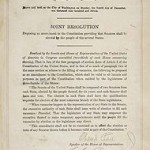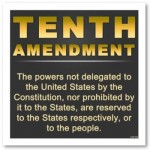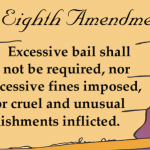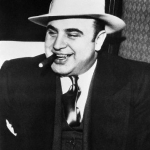The list of colonial grievances against King George in the Declaration of Independence included: “For depriving us in many cases, of the benefits of Trial by Jury: … He has abdicated Government here…” In Article III, the unamended Constitution provided for jury trials in criminal cases[1] as follows: “The Trial of all Crimes, except in Cases […]
Sixth Amendment’s Speedy Trial Right: Ancient, Worthy and Elusive
The Constitution’s Bill of Rights contains many protections for those the government accuses of having committed a crime. Among them is the Sixth Amendment right to a “speedy trial”. The provision is stated: “In all criminal prosecutions, the accused shall enjoy the right to a speedy … trial” The right may has old roots and […]
The Sixth Amendment’s Right to the Assistance of Counsel
Thanks to television police reading the Miranda Warnings people are familiar with a criminal defendant’s right to an attorney and that an indigent defendant may have appointed counsel. Such protections have not always been part of United States law. The right to an attorney is found in the Constitution’s Sixth Amendment. The Sixth Amendment was ratified as part of the Bill […]
Fourth Amendment Probable Cause for a Warrantless Arrest
A police officer cannot arrest a citizen without a warrant based upon a hunch or mere suspicion. He must have “probable cause”. The US Constitution‘s Fourth Amendment[1] requires a warrant for a person or his property to be “seized” or searched by a government agent. The law has developed allowing government agents to conduct warrantless […]
The Seventeenth Amendment: Destroying State Sovereignty
From 1789 to 1913 the power to choose United States Senators was vested by the Constitution in the State legislatures. The Seventeenth Amendment altered the process by providing for direct election of Senators by the people. This fundamentally altered a carefully balanced power structure built into the unamended Constitution that served important purposes: to limit federal power […]
The Tenth Amendment to the US Constitution
“The Tenth Amendment is the foundation of the Constitution.” – Thomas Jefferson Among the questions raised by opponents of the Constitution during the ratification debates was the lack of an express limit on federal power, and that it would be a danger to individual freedoms and to the powers of the states. In response to […]
Pennsylvania Mutiny Chases Congress to Princeton, NJ
The Constitution provided for the creation of a “federal enclave” for the United States capital with these words: “To exercise exclusive Legislation in all Cases whatsoever, over such District (not exceeding ten Miles square) as may, by Cession of particular States, and the Acceptance of Congress, become the Seat of the Government of the United […]
Eighth Amendment: Banning Cruel and Unusual Punishment
The Eighth Amendment to the US Constitution is part of the Bill of Rights. Along with the Fourth, Fifth and Sixth Amendments it recognizes procedural rights for persons accused of crimes. The purpose of these procedural rights is to protect an individual’s inalienable natural right to liberty. When originally ratified in 1791, the Bill of […]
The Seventh Amendment: Right to a Jury in Federal Civil Trials
The Founding Fathers had a healthy fear of government power. They relied upon citizen juries to check that power. The suspension of jury trials was one of Declaration of Independence grievances against King George. The Constitution’s 7th Amendment reflects colonial history and beliefs. John Adams described the place of the jury in the system of […]
21st Amendment Repeals 18th and Prohibition: Restriction on Liberty Fails
The only constitutional amendment ever repealed was the 18th which had ushered in Prohibition. The 18th Amendment was also the only amendment to restrict individual liberty rather than restrict government power.1 As the only such restriction, it was the only constitutional amendment at odds with the unalienable rights outlined in the Declaration of Independence and contrary to the natural […]














